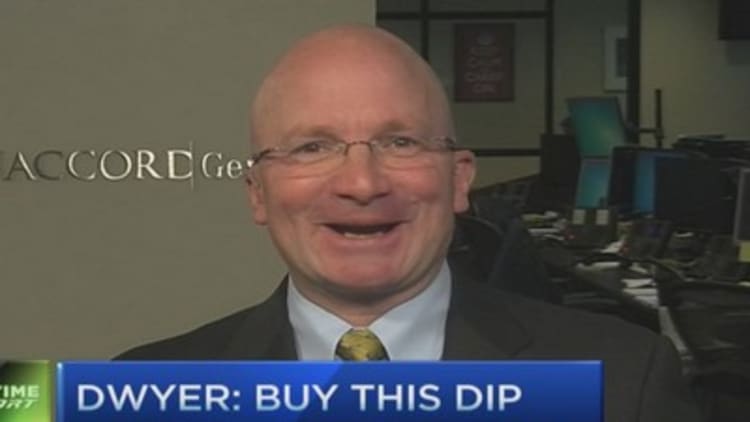
The fundamental case for stocks remains intact, one of Wall Street's biggest bulls said Monday.
Despite some of the year's worst declines in the major indexes last week, Canaccord Genuity's chief strategist, Tony Dwyer, sounded steadfastly positive on stocks.
"I'm not a big fan of people that come in and they give you a number, then all of a sudden the market fluctuates a little bit and they back away," he said. "Ultimately, the reasoning that I had for that price target remains in place."
On CNBC's "Halftime Report," Dwyer said the stabilization of the U.S. dollar, along with energy prices, was crucial to higher stock prices.
"I think a lot of what's scared people are some of the ETFs and high-yield debt, the and the ," he said. "We still have low and stable inflation. We have a Fed that is acting increasingly dovish over the weekend. We have a steep yield curve. Money availability is improving."
Any comparisons to the economic troubles of 2007 or 1999 are wrong, Dwyer said, because credit remains available. "What we're going to have, clearly, is slower growth, which is probably what's hitting stocks a little bit."
Dwyer held on to his 2,230 year-end price target for the S&P 500, one of the most bullish targets on Wall Street.
Read MoreWhat to expect from stocks this week: Pros
Mega-cap stocks were the way to go, he added.
"If the average mega-cap stock is down 7 percent and some of the small caps are down 40 percent, is that the point you want to be a seller?" he said. "I would recommend our institutional accounts be a buyer because if you look at any chart of the market and I told you in a bull market where credit is available, that's the key. In any market where the yield curve remains steep or not inverted, would you love to have bought halfway through any correction? I think every institution on the planet would say 'yes.'"
Credit availability, Dwyer reiterated, was key.
"Ultimately, it comes down to what is restrictive in credit," he added. "Credit gets restricted to whatever percentage of the population you want to use when banks are not incentivized to give the loan and consumers aren't demanding the loans. Neither of those are in place in the U.S."
Read MoreWhat's causing decline in crude oil prices: Dan Dicker
Dwyer noted that he was looking at a three-month horizon.
"I would be the first to admit I am a lousy trader," he said. "What I think we've got to look at, however, is risk-reward from current levels, and that risk-reward over the next three months looks pretty good."


